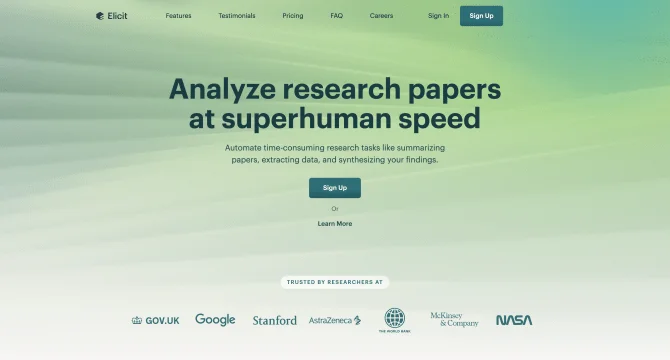Introduction
Elicit AI is a cutting-edge AI research assistant that streamlines the process of literature review and data extraction in academic research. By utilizing advanced language models, Elicit AI automates time-consuming tasks such as summarizing papers, extracting data, and synthesizing findings. With a database of 125 million academic papers, Elicit AI enables researchers to search using natural language, receive one-sentence abstract summaries, and select relevant papers for further analysis. The platform also allows users to upload their own PDFs for quick summarization and to ask direct questions to the papers, receiving answers with sources cited. Elicit AI's user-friendly interface and powerful search capabilities make it an indispensable tool for researchers across various disciplines.
background
Developed by a team of experts, Elicit AI has been designed to meet the demands of modern research. With a focus on empirical domains involving experiments and concrete results, Elicit AI excels in fields such as biomedicine and machine learning. The platform's development is ongoing, with continuous fine-tuning of models to ensure accuracy and relevance. Elicit AI is currently used by over 2 million researchers, highlighting its significant impact on the research community.
Features of Elicit AI
Search for Research Papers
Elicit AI allows users to search a vast database of academic papers using natural language queries, making it easy to find relevant literature.
Automated Summaries
The tool provides one-sentence abstract summaries for quick insights into paper content.
Data Extraction
Elicit AI extracts key details from papers into organized tables, saving time and effort.
Concept Synthesis
It identifies themes and concepts across multiple papers, synthesizing information to provide a comprehensive view.
PDF Upload and Analysis
Users can upload their own research papers for analysis, receiving quick summaries and the ability to ask questions directly to the text.
Answer Sourcing
Every answer provided by Elicit AI is supported by references, allowing users to verify information directly from the source.
Workflow Automation
Elicit AI automates systematic reviews and meta-analyses, reducing the time and cost associated with these tasks.
Cross-Disciplinary Research
With coverage of all academic disciplines, Elicit AI supports research across a wide range of fields.
How to use Elicit AI?
To use Elicit AI, start by asking a research question or uploading a PDF. The platform will provide relevant papers and summaries. Select papers for detailed analysis, extract data into tables, and ask specific questions to the papers for in-depth insights. Always verify answers using the provided sources.
Innovative Features of Elicit AI
Elicit AI's innovation lies in its ability to understand and process natural language queries, providing rapid and accurate synthesis of research papers. Its capacity to automate complex research tasks and provide direct answers with source citations sets it apart in the field of AI research tools.
FAQ about Elicit AI
- How do researchers use Elicit AI?
- Researchers use Elicit AI to speed up literature reviews, find papers not discovered through traditional methods, automate systematic reviews and meta-analyses, and learn about new domains.
- What is Elicit AI not a good fit for?
- Elicit AI is less effective for identifying facts not documented in academic papers or for theoretical and non-empirical research domains.
- What types of data can Elicit AI search over?
- Elicit AI searches over 125 million academic papers from the Semantic Scholar corpus, covering all disciplines, using full texts or abstracts when full texts are not available.
- How accurate are the answers in Elicit AI?
- Approximately 90% of the information in Elicit AI is accurate, though users should always verify the information provided.
- What is Elicit Plus?
- Elicit Plus is a subscription offering additional features and monthly credits, allowing up to 12,000 credits per month for advanced usage.
- What are credits in Elicit AI?
- Credits are used to pay for the costs of running workflows and adding columns to tables within the app.
- How can users get in contact with the Elicit AI team?
- Users can reach out via email at info@elicit.com or help@elicit.com for feedback, comments, or assistance.
- What happens to papers uploaded to Elicit AI?
- Uploaded papers remain private and are not shared with anyone else.
Usage Scenarios of Elicit AI
Academic Research
Elicit AI is used for conducting thorough literature reviews and synthesizing research findings in academic papers.
Market Analysis
In market research, Elicit AI can analyze consumer behavior studies and competitor analysis reports to identify trends and insights.
Medical Research
For medical professionals, Elicit AI can quickly summarize clinical trial results and medical literature to inform evidence-based practices.
Education
Educators can utilize Elicit AI to stay updated with the latest research in their field and integrate current findings into their teaching materials.
Policy Making
Policy analysts can use Elicit AI to review a wide range of research to inform policy decisions and develop evidence-based strategies.
User Feedback
Elicit AI has rapidly surfaced a lot of interesting things I hadn't found through traditional search engines.
I use Elicit almost every day for researching medical issues. It gets better and better. It's simply the best tool to stay well informed.
Quickly becoming my front page for exploring unfamiliar literature. Amazingly powerful way to identify high value seeds I can then mine and explore further.
others
Elicit AI stands out for its ability to handle large volumes of academic literature efficiently, providing a significant boost to researchers who require quick and accurate synthesis of information. Its integration with various academic databases and the capacity to process natural language queries make it a versatile tool for both novice and experienced researchers.
Useful Links
Below are the product-related links, I hope they are helpful to you.
